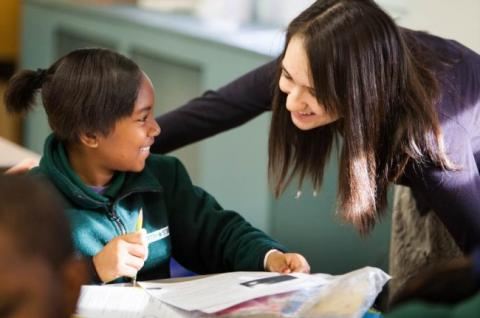Lehigh Offers English as a Second Language Certification

With the population of English language learners growing in the United States, teachers trained in how to best instruct children who are not able to communicate fluently in English are in high demand. That preparation has an unexpected benefit: It makes teachers better at working with all students.
Sara Kangas, assistant professor of Teacher Education at Lehigh University’s College of Education, and the creator of Lehigh’s English as a Second Language certification program, has seen that transformation up close.
In working with teachers and those training to be teachers, Kangas relishes the “a-ha” moments when her students realize that many of the instructional methods they are learning for English language learners will work well with students across the board.
“So, for example, demonstrating or modeling an activity that you want students to complete, drawing on more than just your language -- using visuals, using manipulatives -- those are instructional practices that would benefit everyone, whether an English learner or not,” she says.
Lehigh’s ESL certification program is 16-18 credits and can be done in as little as 18 months with the classes available at night and most online. Those taking the ESL courses do not have to be proficient in a second language, Kangas said, but they must have their teacher certification or be in the process of pursuing it.
Nationwide, the percentage of public school students who are English language learners (ELL) rose from 8.1 percent in 2000 to 9.5 percent in 2015, according to the U.S. Department of Education. The numbers are also climbing in the Lehigh Valley region, with 11.6 percent of Allentown School District students and 6.1 percent of Bethlehem Area School District students considered ELL students. The Annie E. Casey Foundation’s Kids Count Data Center reported that in 2016, more than a fifth of children between the ages of 5-17 spoke a language other than English at home.
Yet a 2017 study by the National Academies of Sciences, Engineering and Medicine found that many schools are falling short in providing the kind of instruction English learners need.
Kangas’s research focus has been on English learners who also have disabilities and earlier this year she was awarded the 2018 James E. Alatis Prize from the International Research Foundation for English Language Education for her research focusing on that population.
That emphasis is especially timely because the federal Every Student Succeeds Act, enacted in 2015, requires school districts to monitor not just whether English learners are making progress but also whether English learners with disabilities are improving academically.
“This population of students and their academic needs are really coming to the forefront,” Kangas says.
Families of children with disabilities who are English learners typically face greater challenges receiving proper services. Many of the parents still acquiring English themselves may not be aware that they are legally entitled to such services, Kangas said.
Lehigh’s ESL certification program emphasizes that English learners are the responsibility of all the teachers in a school, not just ESL teachers.
“So one of the classes, for example, focuses on co-teaching and how to work with general education teachers to build those supports for English learners in the general education classes,” Kangas says.
Supporting Lehigh’s ESL certification curriculum is a strong foundation of research into best practices in teaching.
“I think one thing that’s unique about Lehigh is that we have research and practice driving the courses together,” Kangas says. “We have faculty who conduct rigorous research that focuses on diverse populations and that really informs and drives the instruction.”